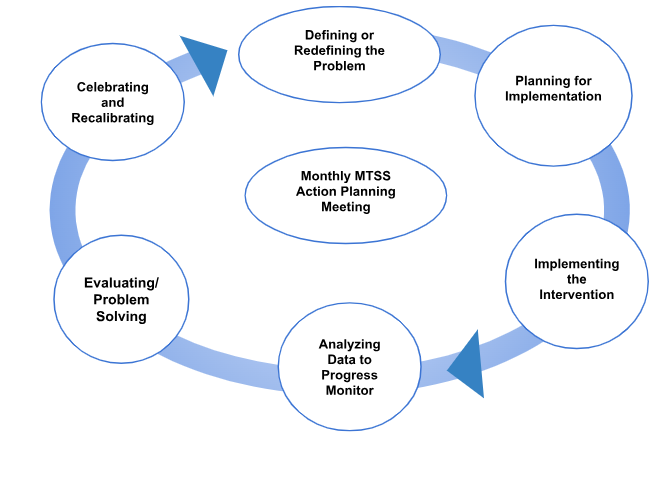Monthly MTSS action planning
The work of the MTSS teams begins with an initial needs assessment, but is sustained over time with monthly action planning meetings. During these meetings, the MTSS teams look at their comprehensive plan and each of the interventions they have implemented. They then analyze the data they have identified to monitor the progress of each intervention. This includes evaluating how far they have come in meeting their goal, problem-solving to address concerns, celebrating successes, recalibrating interventions that have not yet achieved success, and defining or redefining the problems or goals that they are working to address.
Defining or redefining the problem
A problem of practice is a gap between the current state of practice and the desired state of practice. It can include any area of practice, such as teaching, learning, or leadership.
Planning for implementation
By following these best practices, there is a greater chance of successfully implementing a MTSS and achieving the desired outcomes.
- Start with an agenda: This provides structure, clarity, and direction to the MTSS planning meeting and helps ensure that all necessary topics are addressed.
- Develop a clear understanding of the problem or opportunity: What is the gap between the current state and the desired state? What are the specific goals of the implementation?
- Identify all of the stakeholders: Who will be affected by the implementation? Who needs to be involved in the planning process?
- Gather data and evidence: What data is available that can inform the planning process? What research is available on similar implementations?
- Develop a plan that is feasible and realistic: The plan should be achievable within the given time frame and with the available resources.
- Get buy-in from all stakeholders: A majority of stakeholders need to be on board with the plan in order for it to be successful.
- Communicate the plan to all stakeholders: Make sure that everyone knows what is expected of them and when.
Implementing the intervention
- Start by modeling: Show your support for the strategy by using it in your own teaching and by speaking positively about it to others.
- Offer to help with implementation: This could involve providing training, coaching, or resources.
- Be patient: It takes time for new strategies to be implemented and have an impact. Don’t get discouraged if you don’t see results immediately.
- Be flexible: Things don’t always go according to plan. Be willing to make changes as needed.
Progress monitor by analyzing data
Monitoring student progress is crucial to the success of any MTSS intervention as it helps to determine its effectiveness and make necessary adjustments to improve student outcomes. Effective progress monitoring involves collecting and analyzing data over time to gauge progress and identify areas that require additional support. While the monitoring approach may differ depending on the intervention and student needs, adhering to general principles is key to ensuring success. By following these principles, schools can track student progress effectively and ensure that MTSS interventions lead to positive outcomes and improved student success.
- Be clear about the goals of the intervention: What do you want to achieve with the intervention?
- Choose the right measures: The measures you choose should be aligned with the goals of the intervention. For example, if the intervention is designed to improve reading comprehension, you should choose measures that assess reading comprehension.
- Collect data regularly: The more data you collect, the better you will be able to track student progress and make adjustments to the intervention as needed.
- Use the data to make decisions: The data you collect should be used to make decisions about the intervention, such as whether it is working, whether it needs to be modified, or whether it should be discontinued.
Evaluating and problem solving
School-wide MTSS interventions aim to enhance the overall school atmosphere and can address various areas, including academic achievement, behavior, and social-emotional development. To evaluate the effectiveness of a school-wide MTSS intervention, data collection, surveys, focus groups, and school and classroom observations must be incorporated into the evaluation process. By employing these evaluation methods, schools can tailor the intervention to the specific needs of their students, leading to a positive school culture and improved student outcomes.
There are a number of different ways to evaluate school-wide interventions. Some common methods include:
- Data collection: Collecting data on student outcomes, such as attendance, behavior, and academic achievement.
- Surveys: Surveying students, teachers, and parents about their perceptions of the school climate and culture.
- Focus groups: Conducting focus groups with students, teachers, and parents to get their feedback on the schoolwide intervention.
- Observations: Observing the school environment to see how the intervention is being implemented and how it is impacting students.
Celebrating and Recalibrating
Celebrate your team’s successes in implementing MTSS! Take a moment to reflect and discuss as a team when you identify a successfully implemented intervention. Acknowledge the hard work that went into achieving this triumph and recognize those who contributed to the success.
If your team identifies an MTSS intervention that isn’t yielding the expected success, pivot and recalibrate your efforts. Ensure that the intervention aligns with your school’s mission, vision, and MTSS goals, and brainstorm modifications or refinements to meet the intended MTSS goal, as discussed in the MTSS Handbook.
Let’s shift the MTSS intervention to achieve the desired outcomes, while aligning with the school’s priorities and goals, and ensuring it’s feasible, sustainable, and supported by all MTSS stakeholders. With continued hard work and celebration of successes, your team can make great strides in improving outcomes for students through MTSS.

